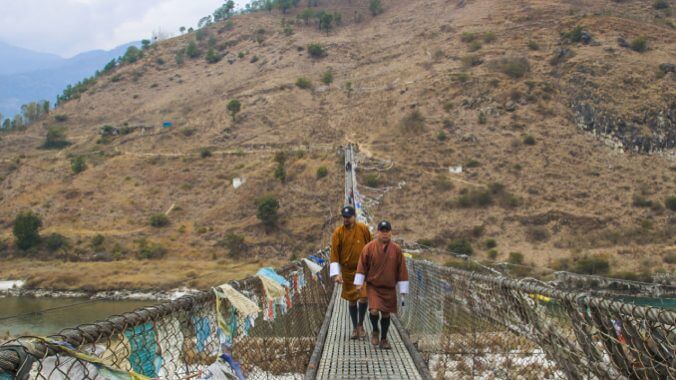Agent of Happiness Takes Us on an Intimate Survey of Satisfaction

Imagine if your government was, even superficially, concerned with your happiness. While so many countries use the boogeyman of The Economy to distract its people from the atrocities of the world (sometimes committed by those very countries), Bhutan, brilliantly, found a far buzzier acronym than Gross Domestic Product. It tracks Gross National Happiness. No more worrying about vague manipulable factors like inflation or the unemployment rate—just ask yourself, “Am I happy?” Ok, to be fair, Arun Bhattarai and Dorottya Zurbó’s documentary Agent of Happiness makes it clear that it’s a lot more complicated than that (and just as made up as stock prices). But even if the Bhutanese government doesn’t really care if its people are happy, posing this question to its populace is at least a diversion that encourages introspection. Those on the front lines, collecting this data for the government, are professionally confronted by life’s biggest question, interpreted by people from all walks of life. The quiet, intimate charms of Agent of Happiness pulse from this poignant collective consideration, filtered through the personal experience of a professional happiness inspector.
Amber and his coworker drive around the mountainous countryside, looking for folks whose lives they can translate into numbers, recorded on forms and diluted down to a single digit through their job’s complex happiness formula. These census-takers strike a memorable image, in their plaid knee-length gho, white tego underneath with sleeves rolled back, black baseball caps and tall socks. Door-to-door style-wise, Mormons have nothing on Bhutanese government officials. As Amber plays air guitar in the passenger seat and chats about his lacking love life, Agent of Happiness immerses us in a doc that’s partially invested in the day-to-day of a unique profession, partially enraptured by the beauty of Bhutan’s bright colors and vast vistas, and partially surprised to have found itself on a buddy-comedy road trip.
With Amber leading the way, Agent of Happiness was never going to be a simple, dry look at a unique piece of geopolitical trivia. He’s a wistful romantic, a total softie who tears up recounting his dreams and cuts a rug at the drop of a hat. Through elegant conversations during working hours (Bhattarai and Zurbó stay out their doc, letting information naturally flow from their subjects), Amber reveals his desperation to find a wife. A youth spent rising and grinding has looked up and found that it’s grown into lonely middle-age. Amber’s now stuck on the wrong side of the dating game, his own matrimonial clock ticking as he asks others about their satisfying lives and cares for his aging mother—clipping her nails and combing her hair—while his off-screen siblings have their own families.
On top of his desire for marriage is his desire for citizenship. The brutal Bhutanese ethnic cleansing of Lhotshampa (ethnic Nepalis), codified in the Bhutan Citizenship Act of 1985, has displaced (in the best cases) over 100,000 people. Amber lost his rights as a citizen when he was just a child, and he’s been petitioning the very government he works for ever since. This festering contradiction at the heart of Agent of Happiness gives the doc a bitter bite, and encourages our skepticism if the phrase “Gross National Happiness” didn’t already set off our propaganda alarm bells.
This struggle, though deeply connected to both Amber’s professional and personal lives (leaving the country for a vacation is impossible; he can’t get a passport), can feel shoehorned: It’s thematically essential, but hard to introduce as organically as the interview subjects or the GNH process. I mean, Bhutan broadcasts a commercial specifically telling its viewers to cooperate with the GNH, emphasizing the government’s investment in its people and literally writing out the mathematical formula legitimizing this care. It’s a little creepy, but at least it’s a convenient tool for a documentary. Every once in a while, Bhattarai and Zurbó simply cut back to Amber’s plight with his nation, watching him workshop his pleas in the hopes that this time will make the difference.
-

-

-

-

-

-

-

-

-

-

-

-

-

-

-

-

-

-

-

-

-

-

-

-

-

-

-

-

-

-

-

-

-

-

-

-

-

-

-

-








































